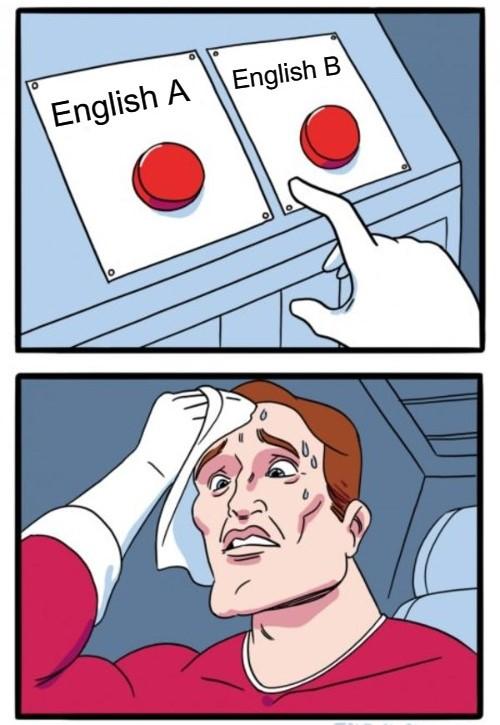As an expert International Baccalaureate Extended Essay tutor, I understand that choosing the right subject area for your Extended Essay is a crucial decision that can impact your overall experience and success in the IB Diploma Program. But how should I select belween English A and English B for my IB EE?
The Extended Essay, a 4,000-word independent research paper, provides an opportunity for students to delve deep into a topic they are passionate about while honing their research and writing skills.
In this article, I will share my knowledge and insights with IB students seeking assistance in differentiating between English A and English B Extended Essays, helping you make an informed decision based on your interests and goals.
Subject Area Focus
Let me start from the very beginning and give you an overall comparison of English A and English B extended essays.

English A Extended Essay
The English A Extended Essay is centered on the in-depth analysis of literary works, which can encompass novels, plays, and poetry. Students are expected to engage critically with their chosen text(s) and provide a thorough analysis of various aspects, such as themes, characters, plot, and literary techniques.
The objective is to demonstrate a deep understanding of the work’s artistic and cultural significance and to offer original interpretations and insights.
English A essays can explore topics within a single literary work, compare multiple works by the same author, or analyze different texts that share common themes or elements.
Some examples of English A Extended Essay topics:
- An exploration of the theme of isolation in Virginia Woolf’s “Mrs. Dalloway” and “To the Lighthouse”
- The role of nature and its symbolism in the poetry of Emily Dickinson
- A comparative analysis of tragic heroes in Shakespeare’s “Othello” and “Macbeth”
English B Extended Essay
In contrast, the English B Extended Essay is focused on studying language and culture. Rather than delving into the intricacies of a particular literary work, English B essays examine broader topics that explore linguistic, cultural, and societal aspects.
Students may choose to investigate topics such as language acquisition, the role of language in shaping identity, the impact of literature on a specific culture, or the portrayal of cultural values and beliefs in various texts.
Some examples of English B Extended Essay topics.
- The influence of Japanese manga on the perception of gender roles in contemporary Japanese society
- The impact of bilingualism on cognitive development and academic performance
- A comparative analysis of the portrayal of the American Dream in literary works by F. Scott Fitzgerald and contemporary authors
As you can see, the subject area focus for English A and English B Extended Essays differs significantly, with English A concentrating on literary analysis and English B exploring language and culture.
In the following sections, I will discuss the importance of formulating a clear research question, the methodologies and analysis required for each subject area, and the assessment criteria for both English A and English B Extended Essays.
Research Question
A well-formulated research question is crucial for both English A and English B Extended Essays, as it helps guide your investigation and provides a clear focus for your analysis.

Need help with your IB extended essay?
From research and analysis to structuring and editing, our skilled mentors will be by your side, helping you craft an exceptional extended essay that not only meets the wordcount and stringent IB criteria but also reflects your passion for selected IB group.
The research question should be specific, concise, and answerable within the scope of a 4,000-word essay.
Examples of research questions for each subject area:
IB English A
- How does the narrative structure in Emily Brontë’s “Wuthering Heights” contribute to the novel’s exploration of love and obsession?
- In what ways does the use of magical realism in Gabriel García Márquez’s “One Hundred Years of Solitude” reflect and critique the historical and political context of Colombia?
IB English B
- How does code-switching in bilingual communities impact cultural identity and social relationships?
- To what extent do the works of Nigerian author Chinua Achebe challenge Western perspectives on African culture and history?
Methodology and Analysis
Let’s move forward to the differences and common things in the methodology and analysis of these two IB EEs.
English A
- Close reading and textual analysis are the primary methodologies for English A essays. You should analyze the chosen text(s) in depth, examining elements such as themes, characters, plot, and literary techniques.
- Consider incorporating theoretical approaches or critical lenses (e.g., feminist, postcolonial, or psychoanalytical) to enrich your analysis and offer unique insights.
English B
- The methodology for English B essays varies depending on your research question. Possible approaches include discourse analysis, sociolinguistic analysis, or cultural studies.
- You might analyze primary sources, such as literature, films, or interviews, as well as secondary sources like scholarly articles, to support your argument.
Assessment Criteria of English A & B Extended Essays
Both English A and English B Extended Essays share some common assessment criteria, such as formal presentation, use of appropriate terminology, and critical thinking.
However, there are differences in expectations for subject-specific content and analysis.
English A
- Focus on literary analysis and interpretation, demonstrating an in-depth understanding of the text(s) and their artistic and cultural significance.
- Provide original insights and interpretations, supported by textual evidence and scholarly sources.
English B
- Explore linguistic and cultural aspects, using relevant methodologies and theoretical frameworks.
- Examine the broader context of the topic, considering historical, social, and political factors.
Tips for Success with your EEs

Before you selected one of this subjects for your IB extended essay, below is a list of tips if you want to succeed with English B and English A extended essays.
- Choose a subject area and topic that align with your interests and strengths. Passion for the subject will help you stay motivated throughout the research and writing process.
- Work closely with your IB supervisor, seeking guidance and feedback to ensure your essay meets the necessary criteria.
- Conduct thorough research using a variety of reliable sources, such as academic journals, books, and reputable websites.
- Plan your time effectively to allow for drafting, revising, and editing your essay. Aim to complete your first draft well before the deadline, leaving ample time for revisions and improvements.
Case Studies & Examples
Providing examples of successful English A and English B Extended Essays can further illustrate the differences in focus, methodology, and analysis.
English A
- An Extended Essay examining the portrayal of gender and power dynamics in Margaret Atwood’s “The Handmaid’s Tale,” using feminist literary theory to analyze the novel’s dystopian society and its implications for contemporary gender issues.
English B
- An Extended Essay exploring the impact of social media on language use among teenagers, using discourse analysis to examine the linguistic features of online communication and discussing the implications for linguistic evolution and cultural identity.
Now you know the main differences between English A and English B
In conclusion, the main differences between English A and English B Extended Essays lie in their subject area focus, methodologies, and assessment criteria.
By understanding these distinctions and choosing the right subject area, you can now select the preferred subject based on your interests and goals. Remember to seek guidance from your supervisor, conduct thorough research, and engage in the writing and revision process diligently.
Additionally, if you require professional assistance with topic suggestions, research guidance, writing your IB EE proposal or extended essay writing, our company, Extended Essay Writers, is here to help.

Need help with your IB extended essay?
From research and analysis to structuring and editing, our skilled mentors will be by your side, helping you craft an exceptional extended essay that not only meets the wordcount and stringent IB criteria but also reflects your passion for selected IB group.
Our team of experienced writers and subject matter experts can provide personalized support tailored to your specific needs, ensuring that you submit an Extended Essay that meets the highest IB standards.
Whether you need guidance in the early stages of topic selection, writing an EE RPPF, or a comprehensive review of your final draft, our dedicated team is committed to helping you achieve success in your Extended Essay and your overall IB journey.
Reach out to us today and let us be a part of your academic success story.
Luke MacQuoid
Luke MacQuoid has extensive experience teaching English as a foreign language in Japan, having worked with students of all ages for over 12 years. Currently, he is teaching at the tertiary level. Luke holds a BA from the University of Sussex and an MA in TESOL from Lancaster University, both located in England. As well to his work as an IB Examiner and Master Tutor, Luke also enjoys sharing his experiences and insights with others through writing articles for various websites, including extendedessaywriters.com blog
- Group Knowledge vs. Individual Knowledge in TOKby Luke MacQuoid
- Impact of Artificial Intelligence on Knowledge and Learningby Luke MacQuoid
- Challenges in Translating Knowledge Across Languages in TOKby Luke MacQuoid
- What Is an Interdisciplinary TOK Essay?by Luke MacQuoid
- Impact of Digital Media on Knowledge Perception in TOKby Luke MacQuoid
- Complexities of Bias in Knowledge Productionby Luke MacQuoid





